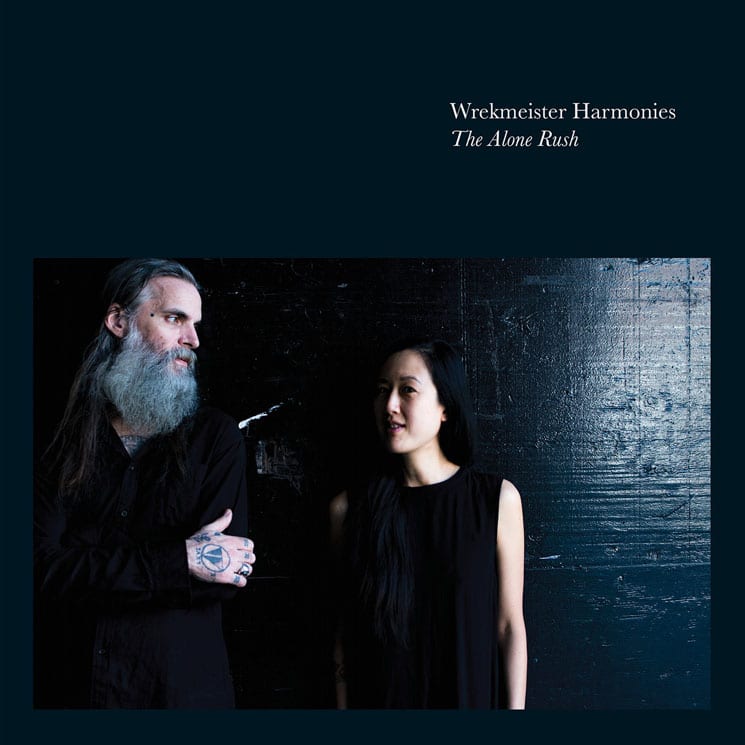If you've ever been lucky enough to see Wrekmeister Harmonies perform live in some iteration, you'll understand how important physicality and presence is to their work. Considering that the band's Soybomb set in Toronto a couple years ago blew the power out in the little DIY venue, and their first record was titled Recordings Made In Public Spaces, the themes of isolation and distance that frame their new album might seem like an unexpected turn. The group's core members, J.R. Robinson and Esther Shaw, were confronted with taxing and uncontrollable personal circumstances since their last studio project in 2016, dealing intimately with death and caring for a family member with a chronic illness.
Following these experiences, the two decided to take a reprieve from the urban bustle of metro Chicago and record their seventh LP, The Alone Rush, in Astoria, Oregon with little equipment or personnel besides themselves and their instruments. The resulting compositions are the most sparse and harrowing Wrekmeister Harmonies have ever produced. They have a mournful but meditative quality to them that is realized through dynamic space, subtle textural layering, and the band's trademark interlocking instrumental drones.
Compared to their earlier work, it is probably the least "metal" thing they have released thus far, but The Alone Rush is no less intense for its restraint. Centrepiece "Forgive Yourself and Let Go," for instance, builds from a cacophonous drone of horns and auxiliary percussion over 14 minutes into a powerful crescendo that uses a heavy sheet of organ and decomposing guitar feedback for emphasis rather than sheer volume. The end of "Behold! The Final Scream" does feature a brief, chilling shriek, but it is a cry of anguish rather than an aggressive vocal. Robinson's singing stays in the gloomy baritone depths, and his ruminations on mortality are reminiscent of Nick Cave at his most sombre.
Thor Harris provides his ever-versatile drumming talents as the album's only guest, aside from producer Martin Bisi. His presence is appropriate, as the record has a similar atmosphere to Swans' 1996 double LP, Soundtracks For The Blind. It balances eerie ballads like "Covered In Blood From Invisible Wounds" with moments of quiet beauty, like the closing title track, all while threading songs and movements together as though they were one continuous performance.
Taken in its entirety, The Alone Rush plays like a glimpse into a private conversation between two longtime friends and collaborators. The record's lyrical and instrumental treatments of death feels personal and unknowable in a way that is very emotionally arresting. This insular quality can make the listening experience seem somewhat intrusive, but it is an undeniably gorgeous work that can be honestly appreciated even when it becomes uncomfortable.
(Thrill Jockey)Following these experiences, the two decided to take a reprieve from the urban bustle of metro Chicago and record their seventh LP, The Alone Rush, in Astoria, Oregon with little equipment or personnel besides themselves and their instruments. The resulting compositions are the most sparse and harrowing Wrekmeister Harmonies have ever produced. They have a mournful but meditative quality to them that is realized through dynamic space, subtle textural layering, and the band's trademark interlocking instrumental drones.
Compared to their earlier work, it is probably the least "metal" thing they have released thus far, but The Alone Rush is no less intense for its restraint. Centrepiece "Forgive Yourself and Let Go," for instance, builds from a cacophonous drone of horns and auxiliary percussion over 14 minutes into a powerful crescendo that uses a heavy sheet of organ and decomposing guitar feedback for emphasis rather than sheer volume. The end of "Behold! The Final Scream" does feature a brief, chilling shriek, but it is a cry of anguish rather than an aggressive vocal. Robinson's singing stays in the gloomy baritone depths, and his ruminations on mortality are reminiscent of Nick Cave at his most sombre.
Thor Harris provides his ever-versatile drumming talents as the album's only guest, aside from producer Martin Bisi. His presence is appropriate, as the record has a similar atmosphere to Swans' 1996 double LP, Soundtracks For The Blind. It balances eerie ballads like "Covered In Blood From Invisible Wounds" with moments of quiet beauty, like the closing title track, all while threading songs and movements together as though they were one continuous performance.
Taken in its entirety, The Alone Rush plays like a glimpse into a private conversation between two longtime friends and collaborators. The record's lyrical and instrumental treatments of death feels personal and unknowable in a way that is very emotionally arresting. This insular quality can make the listening experience seem somewhat intrusive, but it is an undeniably gorgeous work that can be honestly appreciated even when it becomes uncomfortable.
